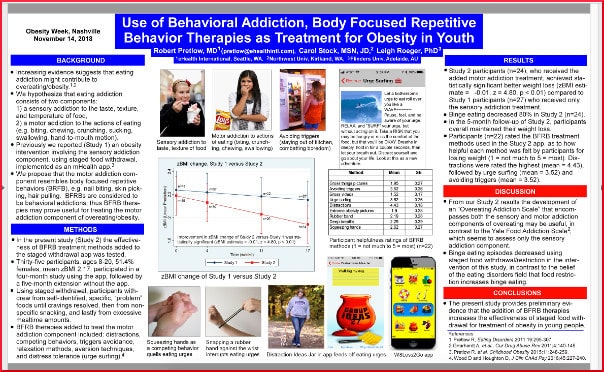
Recently, Dr. Pretlow attended this year’s ObesityWeek meeting in Nashville, TN, and presented a poster (click on image above) whose authors are Robert Pretlow, M.D.; Carol Stock, MSN, J.D.; and Leigh Roeger, Ph.D. Displayed in the new “Reward/Addiction” session, the poster elicited significant interest, particularly from a doctor from Oman in the Persian Gulf, who sees possibilities in a smartphone application to treat both obesity and diabetes.
Organized by the American Society for Metabolic and Bariatric Surgery and The Obesity Society, the event attracted around 3,800 specialists in physical and mental health — doctors, nurses, dietitians, therapists — as well as researchers of the basic, clinical, epidemiological, psychological, and policy-related varieties.
A session titled “Food Addiction or Hedonic Eating: Setting the Record Straight” addressed the ever-more-evident need to bring psychological approaches on board. Diet and exercise are wondrously effective for some people, sometimes. But they are apparently unable to do the job themselves.
An overlooked distinction
One subject that was extensively explored, and that may not have previously been accorded the attention it deserves, is the distinction between initial weight loss and weight-loss maintenance. They need to be recognized as different processes, and it only makes sense that they might call for different approaches, different interventions. While it seems evident that a combined clinical and psychological approach to eating must be employed, there seems to be a notable shortage of professionals who are willing to support the idea of employing addiction treatment methods on obesity.
The hooking factor
Michael Moss, who is both a New York Times journalist and the author of Salt Sugar Fat: How the Food Giants Hooked Us, is certainly not the only person who has noticed that an astonishing variety of food products now contain sugar that does not belong there by any reasonable standard.
He talked about the thinly-veiled and sometimes not even slightly concealed effort that the food industry makes to create products that function just like addictors. Behind closed doors, the creators of processed food throw around terms like “more-ish,” “snackability,” and “cravability.” Their main concern is to determine exactly how much salt, sugar, fat, and which chemicals, are needed to reach the “bliss point.”
Coincidentally, the bliss point is what serious drug users also seek, but seldom find again after their initiatory experiences. Moss is quoted as asking,
What lessons, therapies, solutions are out there that people have tried to apply to other addictive substances? Have those worked? If so, for how many people?
Part of the problem is that the food-consuming public has passively allowed this to happen. In the past few years, much attention has been directed toward requiring manufacturers to honestly list their products’ ingredients. Despite this, many consumers seem comfortable with science-fictional sounding additives, and most never pause to read label information anyway.
Even leaving aside the extra sugar and extra fat, we have undoubtedly been deliberately led to assimilate and expect a lot more salt than is good for us. It is doubtful that much can change until these excesses have been curbed.
Your responses and feedback are welcome!
Source: “ObesityWeek annual meeting highlights cross-disciplinary approach,” Healio.com, 11/09/18
Source: “With ‘bliss points’ and ‘mouth feel,’ food industry plays role in hedonic eating habits,” Healio.com, 11/14/18
Image by eHealth International

 FAQs and Media Requests:
FAQs and Media Requests: 











